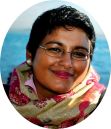Meet the Coaches
Suja Joseph-Malherbe, South Africa
 Suja has a passion for leadership and systems engineering and as such she is quite active in INCOSE. She is a member of the inaugural cohort of the INCOSE Technical Leadership Institute and became a coach in 2020. She served as the President of INCOSE South Africa from January 2017 to December 2018.
Suja has a passion for leadership and systems engineering and as such she is quite active in INCOSE. She is a member of the inaugural cohort of the INCOSE Technical Leadership Institute and became a coach in 2020. She served as the President of INCOSE South Africa from January 2017 to December 2018.
Suja is an INCOSE Certified Systems Engineering Professional (CSEP) and a Solution-focused Brief Coach (ICF-ACSTHs training). She provides training and consultancy services in systems engineering and leadership development to individuals and organisations through Letter27. She is also a sessional lecturer at the Faculty of Engineering and the Built Environment at the University of the Witwatersrand delivering post-graduate courses on systems engineering.
Suja has a bachelor's degree in engineering from the University of Witwatersrand and a master's degree in engineering from the University of Johannesburg. She is a doctoral candidate, and her research proposal is titled “A holistic leadership framework for systems engineering practitioners”.
David Long, United States
 David has spent over 30 years helping organizations assess, adopt, and deploy methods to increase their systems engineering proficiency while simultaneously working to advance the state of the art. David founded and led Vitech where he developed innovative, industry-leading methods and software to engineer next-generation systems. Today, he is the Chief Engineer for Digital Engineering at the Systems Engineering Research Center working to coordinate and advance their digital portfolio. He co-authored A Primer for Model-Based Systems Engineering and frequently delivers keynotes and workshops around the world.
David has spent over 30 years helping organizations assess, adopt, and deploy methods to increase their systems engineering proficiency while simultaneously working to advance the state of the art. David founded and led Vitech where he developed innovative, industry-leading methods and software to engineer next-generation systems. Today, he is the Chief Engineer for Digital Engineering at the Systems Engineering Research Center working to coordinate and advance their digital portfolio. He co-authored A Primer for Model-Based Systems Engineering and frequently delivers keynotes and workshops around the world.
An INCOSE Fellow and Expert Systems Engineering Professional (ESEP), David was the 2014/2015 President of INCOSE. David joined the TLI as a coach in 2019 and currently serves on the INCOSE Board of Directors as the Director for Strategic Integration.